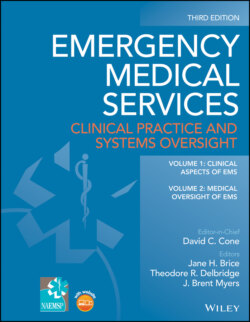Читать книгу Emergency Medical Services - Группа авторов - Страница 480
Magnesium
ОглавлениеLike potassium, the kidney functions to excrete magnesium from the body. A kidney that is impaired by acute or chronic disease may lose its ability to conserve magnesium, while ESRD implies loss of ability to excrete magnesium. Thus, hypomagnesemia can occur in kidney disease and hypermagnesemia in ESRD. A patient with a magnesium disturbance may have an arrhythmia or ECG abnormality, often related to QT interval changes. Classically, patients with low magnesium have increased reflexes and weakness with a prolonged Qtc interval. Hypermagnesemia is associated with hyporeflexia, mental status changes, and respiratory depression progressing to cardiac arrest. ECG findings may mimic hyperkalemia with peaked T‐waves, QRS widening, and possibly complete heart block [4,16].
Table 22.1 ECG changes in hyperkalemia
| Peaked T‐waves | Slow atrial fibrillation |
| PR prolongation | Sine wave |
| Wide unusual QRS complexes | Asystole |
| Conduction blocks | Ventricular fibrillation |
| Bradycardia | Wide complex pulseless electrical activity |
